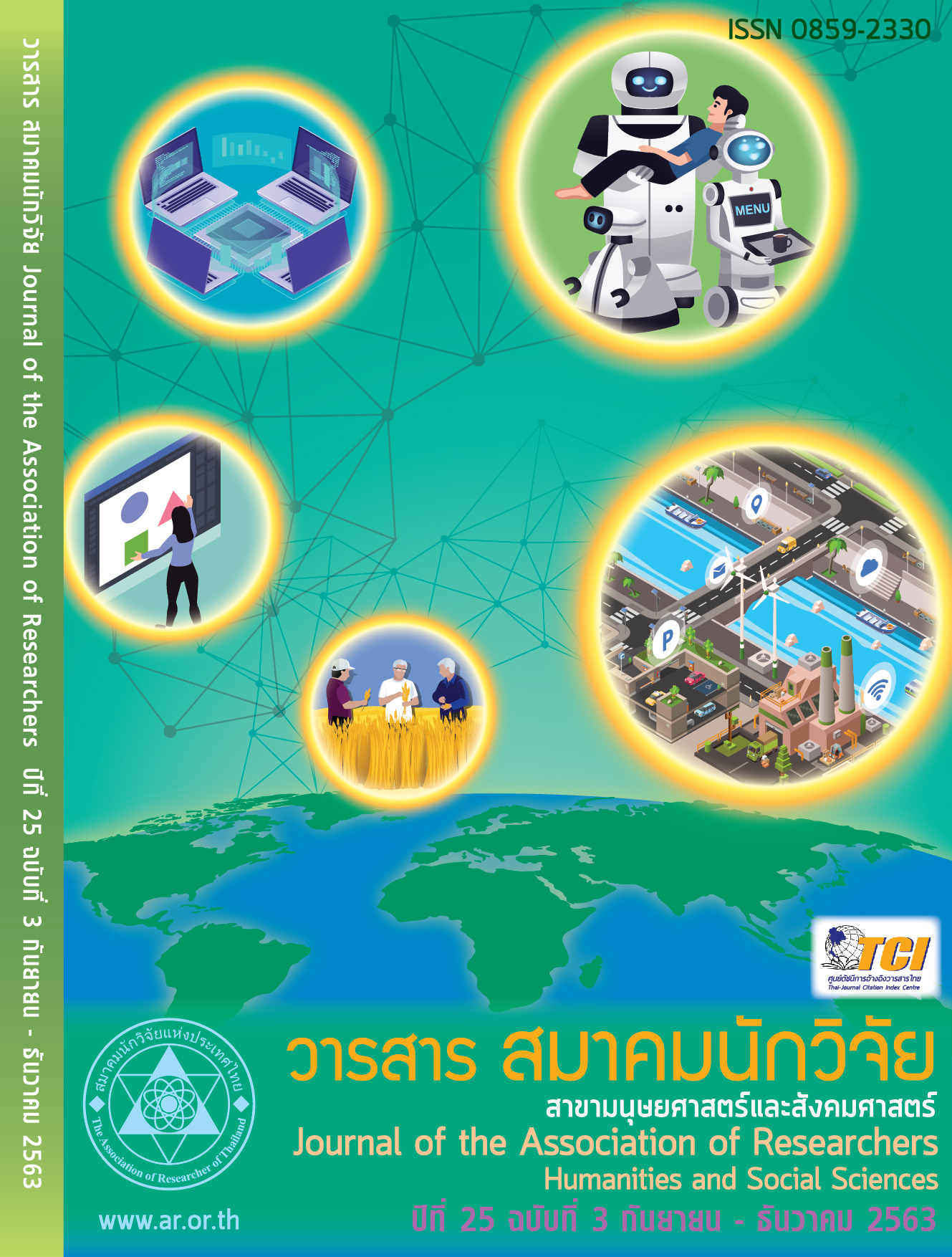Structural Effect of Quality of Work Life, Psychological Well-being and Job Satisfaction towards Job Performance of Teacher volunteers in Pre-school Child Development Center in Nongkhaem, Bangkok
Main Article Content
Abstract
The purposes of this study were to investigate psychological well-being and job satisfaction as a mediated factor between the quality of work-life and job performance of teacher volunteers in the Pre-school Child Development center in Nongkhaem, Bangkok; Samples the study were 100 teacher volunteers in the Pre-school Child Development center in Nongkhaem, Bangkok. The research instrument was a questionnaire; which was statistically analyzed by percentage, means, standard deviation (S.D.), and structural equation model (SEM) analysis. The research results revealed that (1) levels of quality of work-life, psychological well-being, job satisfaction, and job performance of teacher volunteers were overall averaged at 3.28, 3.37, 3.27, and 3.35 respectively, whereas the standard deviation was ranked at 0.764, 0.788, 0.749 and 0.775 respectively; and (2) the coefficient scale of Boot LLCI of psychological well-being and job satisfaction as a mediated factor between the quality of work-life and job performance of teacher volunteers was at 0.196 and 0.166 respectively, whereas the coefficient scale of boot ULCI was at 0.455 and 0.545 respectively.
Article Details
บทความที่ปรากฏในวารสารนี้ เป็นความรับผิดชอบของผู้เขียน ซึ่งสมาคมนักวิจัยไม่จำเป็นต้องเห็นด้วยเสมอไป การนำเสนอผลงานวิจัยและบทความในวารสารนี้ไปเผยแพร่สามารถกระทำได้ โดยระบุแหล่งอ้างอิงจาก "วารสารสมาคมนักวิจัย"
References
มนตรี พิริยะกุล. (2553). ตัวแบบเส้นทางกำลังสองน้อยที่สุดบางส่วน. กรุงเทพมหานคร: มหาวิทยาลัยรามคำแหง.
สำนักงานเขตหนองแขม กรุงเทพมหานคร. (2562). ข้อมูลของครูอาสาสมัครศูนย์พัฒนาเด็กก่อนวัยเรียนในเขตหนองแขม กรุงเทพมหานคร. กรุงเทพมหานคร: สำนักงานเขตหนองแขม.
สำนักงานเลขาธิการสภาการศึกษา กระทรวงศึกษาธิการ. (2562). มาตรฐานสถานพัฒนาเด็กปฐมวัยแห่งชาติ. กรุงเทพมหานคร: สำนักมาตรฐานและพัฒนาการเรียนรู้.
อรพรรณ บัวอิ่น. (2560). การศึกษาปฐมวัยและพัฒนาการเด็กก่อนวัยเรียนในประเทศกำลังพัฒนา: หลักฐานเชิงประจักษ์จากประเทศไทย. วารสารพัฒนาการเศรษฐกิจปริทรรศน์, 11(1), 73-107.
Bhavani, M., & Jegadeeshwaran, M. (2014). Job satisfaction and quality of work-life: A case study of women teachers in higher education. SDMIMD, 5, 1-12.
Caroli, M. E., & Sagone, E. (2016). Resilience and psychological well-being: Differences for affective profiles in Italian middle and late adolescents. International Journal of Developmental and Educational Psychology, 1(1), 149-160.
Hamad, L. H. (2018). The impact of the quality of work-life on employees’ job performance. Retrieved January 15, 2020, from http://eprints.koyauniversity.org/171/1/Lanja%20Hoshang%20 Hamad-PG%20II%20201809016.pdf.
Jayakumar, A., & Kalaiselv, K. (2012). Quality of work-life an overview. International Journal of Marketing, Financial Services & Management Research, 1(10), 140-151.
Kalinnikova, L., Shaplavska, J., & Zavodilov, A. (2016). Psychological well-being relation to individual orientation in early adulthood. Engineering for Rural Development, 25, 149-154.
Leite, A., Ramires, A., Moura, A. D., Souto, T., & Maroco, J. (2019). Psychological well-being and health perception: Predictors for the past, present, and future. Arch Clin Psychiatry, 46(3), 53-60.
Likert, R. A. (1932). A technique for the measurement of attitudes. Archives of Psychology, 140, 5-53.
Mishra, P. K. (2013). Job satisfaction. IOSR Journal of Humanities and Social Science, 14(5), 45-54.
Porkalai, D., & Sivapriya, S. (2018). QWL existence and its impact on psychological well-being in medium and large-scale manufacturing industries. An International Journal of Management Studies, 8(3), 240-246.
Pourebrahim, T., & Rasouli, R. (2019). Meaning of life and psychological well-being during adult, older adult, and oldest old. Elderly Health Journal, 5(1), 40-46.
Rahim, N. B., & Siti-Rohaida, M. Z. (2015). Career satisfaction and psychological well-being among professional engineers in Malaysia: The effect of career goal development. Asian Academy of Management Journal, 20(2), 127-146.
Shiqian, L. W. (2018). Factors affecting the job performance of employees at the workplace in the higher education sector of China. International Journal of Scientific and Research Publications, 8(1), 219-223.
Sinha, C. (2012). Factors affecting the quality of work-life: Empirical evidence from Indian organizations. Australian Journal of Business and Management Research, 1(11), 31-40.
Sree, R. N. B., & Satyavathi, R. (2017). Employee job satisfaction. International Journal of Engineering and Management Research, 7(5), 85-94.
Sypniewska, B. A. (2014). Evaluation of factors influencing job satisfaction. Contemporary Economics, 8(1), 57-72.
Teryima, S. J., Faajir, A., & John, E. (2016). Examining employee quality of work-life (QWL) as a determinant of managerial effectiveness in business organizations: A study of Nigeria Breweries Plc, Lagos. Global Journal of Human Resource Management, 4(5), 1-24.
Tripathi, R., Jaiswal, N., Sharma, B. & Malhotra, S. K. (2015). Helminth infections mediated DNA damage: Mechanisms and consequences. Single Cell Biol, 4, 1-7.
Tripathy, L. K. (2017). Impact of quality of work-life on job performance. International Journal of Business Marketing and Management, 2(10), 11-14.
Wadhawan, K. (2016). Psychological well-being as a predictor of job performance and job satisfaction. International Journal of Academic Research and Development, 1(3), 1-3.
Wamy, N. W., & Swamy, D. R. (2013). Quality of work life of employees in private technical institutions. International for Quality Research, 7(3), 431-442.
Waters, L. (2012). Predicting job satisfaction: Contributions of individual gratitude and institutionalized gratitude. Scientific Research, 13(12), 1174-1176.
Yongxing, G., Hongfei, D., Baoguo, X., & Lei, M. (2017). Work engagement and job performance: The moderating role of perceived organizational support. Anales de Psicologia, 33(3), 708-713.
Translated Thai References
Boonmakerd, K., Boonyoo, T., & Piriyakal, M. (2019). The multiple mediation effects of job creation on transferring organizational culture to the job performance of the staff of the Thai Silk Industry in Bangkok. Journal of the Association of Researchers, 24(2), 100-110. (In Thai).
Buain, O. (2017). Pre-primary education and child development outcomes in developing countries: Empirical evidence from Thailand. Development Economic Review, 11(1), 73-107. (In Thai).
Nongkeam District, Bangkok. (2019). Information on Teacher volunteers in Pre-school Child Development Center in Nongkhaem, Bangkok. Bangkok: Nongkeam District. (In Thai).
Office of the Education Council, Ministry of Education. (2019). The national standard for early childhood care, development, and education in Thailand. Bangkok: Bureau of standards and Learning Development. (In Thai).
Piriyakul, M. (2010). Partial least square path modeling (PLS Path Modeling). Bangkok: Ramkhamhaeng University. (In Thai).


